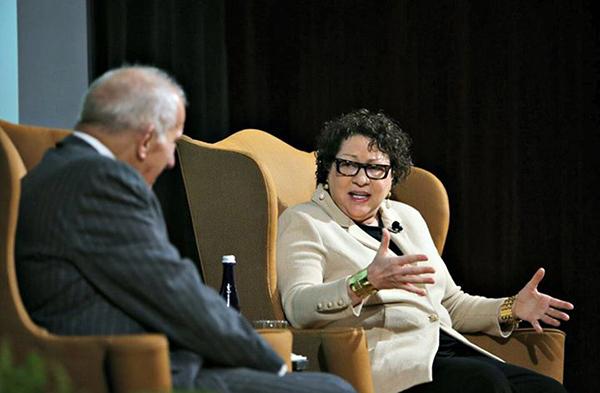Supreme Court Justice Sotomayor Returns to NYU

The NYU Law School hosted a conversation with Supreme Justice Sonia Sotomayor on February 8.
February 9, 2016
Supreme Court Justice Sonia Sotomayor answered questions about the current state of juries in the American judicial system at the NYU School of Law on Monday, hosted by the Civil Liberty Project.
According to their website, the Civil Liberty Project began last fall to assess the current role and place of the jury in the civil justice system. It aims to create education programs for studying and re-evaluating the ways in which juries are chosen and trials are conducted.
Sotomayor, a former adjunct professor at the NYU School of Law and the first latina Supreme Court Justice is known for being the only member of the Supreme Court who has judged a civil jury trial.
Bill Williams, an NYU Law School alumnus, said he was surprised by Sotomayor’s opinion on juries.
“So many people talk about the inefficiencies of the juries, and as a prosecutor, litigator and judge, she’s very much in favor of them,” Williams said.
Sotomayor also discussed the importance of jury duty. Although people have often asked her for ways to evade this obligation, Sotomayor believes that the requirement to perform jury duty forces people to collaborate with one another and exposes them to types of people they may not have otherwise interacted with.
“It is the one responsibility of citizenship that no one else can do,” Sotomayor said. “It is the one activity where you’re asked to serve and make a decision on behalf of the society that you live in.”
Sotomayor further detailed her opinion on the importance of juries in civil disputes, saying that although the founding fathers did not trust juries completely, they put the Seventh Amendment in the Bill of Rights because the monarchy controlled justice at the time. They understood that politics would play a role in the appointment of judges, and juries checked that.
Sotomayor went on to weigh the pros and cons of the various suggestions to change the jury selection and trial processes: allowing jurors to ask questions, take notes and outline a deliberation process for them.
Sotomayor said she has allowed jurors to take notes before. However, she reminds them that they are not stenographers; if they are spending their time taking notes, then they are missing what is actually happening in the courtroom.
She has allowed jurors to ask questions in the past, but stopped the practice when she felt that many of the questions could not be answered, slowing the process down. She also said that she does not feel comfortable implementing how a jury deliberates.
When asked if it is possible to select a jury online, Sotomayor said that while it may be possible, that this would drastically affect the diversity between jurors selected.
In fact, Sotomayor loves trying cases in front of a jury so much that she said she would like to sit on the district court after she retires from the Supreme Court.
Email Farhin Lilywala at [email protected].
























































































































































